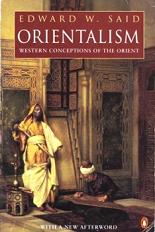
Orientalism
Edward Said
396 pages including index
published in 1978
There are some books that I'm sort of ashamed to review, not because the books themselves are so bad but just because I should've read them years ago. Orientalism is one such book. Both it and its author are so often namechecked by leftwing bloggers that I felt a slight twinge of embarassement for only reading it now. Also, I don't know how it is with you, but I'm often wary to read such widely acclaimed books anyway, as there's something so "Rik the people's poet" about reading Said, or Chomsky for that matter. It can look poseurish and nobody wants to come over as that.
Nevertheless, Orientalism is a genuinely important book, even now, thirty years after its first publication. It's main argument -- that Asia in general and the Middle East in particular have long been misrepresented in the west as "the Orient", an exotic world filled with prejudices and cliches in order to serve imperialist goals in the region -- may look a bit obvious now, not as radical as it was at first publication, but this is in great part because Orientalism laid out this argument so convincingly first. In fact it had such an impact, that even thirty years onwards there are still people trying to cut it down to size, as a quick Google search shows. It touched a nerve, perhaps not in the least because Said was an outsider to the academic orientalist tradition he was criticising.
Orientalism in its original meaning was both the study of eastern societies and cultures, as well as the use of imagery from those cultures in western art. What Said did in his book was to make the assumptions as well as the contradictions in orientalism visible. He does this by concentrating on how the region of "the east" he knows best, the Middle East and Arabia, has been represented in orientalist studies through the ages, starting from early Medieval times, when orientalism was still firmly rooted in Christian terminology. The bulk of Orientalism however is concerned with 19th and 20th century examples of orientalism. Said limits his studies here mostly to English and French orientalist traditions, omitting for example German and Russian studies of the Orient, which he admits might make his criticisms flawed, or at least not as universal as he puts it here.
Said's fundamental criticism of orientalism is that it is 'a style of thought based upon an ontological and epistemological distinction made between "the orient" and (most of the time) "the Occident"'. Also, orientalism "can be discussed and analyzed as the corporate institution for dealing with the Orient -- dealing with by making statements about, authorising views of it, by teaching it, settling it, ruling over it: in short, Orientalism as a Western style for dominating, restructuring, and having authority over the Orient." In this way European culture was able to manage and contain the Orient, even setting itself off against the Orient, strenghten its own identity at the same time. Said believes that through these processes Orientalism has put limitations on thought and action whenever the Orient is in play and that orientalism is used to keep control of the Orient.
Now this is a thesis that needs some care to be able to argue convincingly, which is why Orientalism at times isn't quite the easiest book to follow. Said makes use of a lot of examples of orientalist writing to state his case and is dilligent in establishing the links between them. Reading it requires the same level of care; I tried to read it during my daily commute, but had to give it up. Instead I read it over the course of a weekend spent at my parents, without the internet to distract me.
In all, Orientalism is one of those books you do need to read for yourself, as it's main thesis is easy to grasp but also easy to misrepresent by biased reviewers, as the google search above might show.
Read more about:
Edward Said,
Orientalism,
Middle East,
politics,
book review